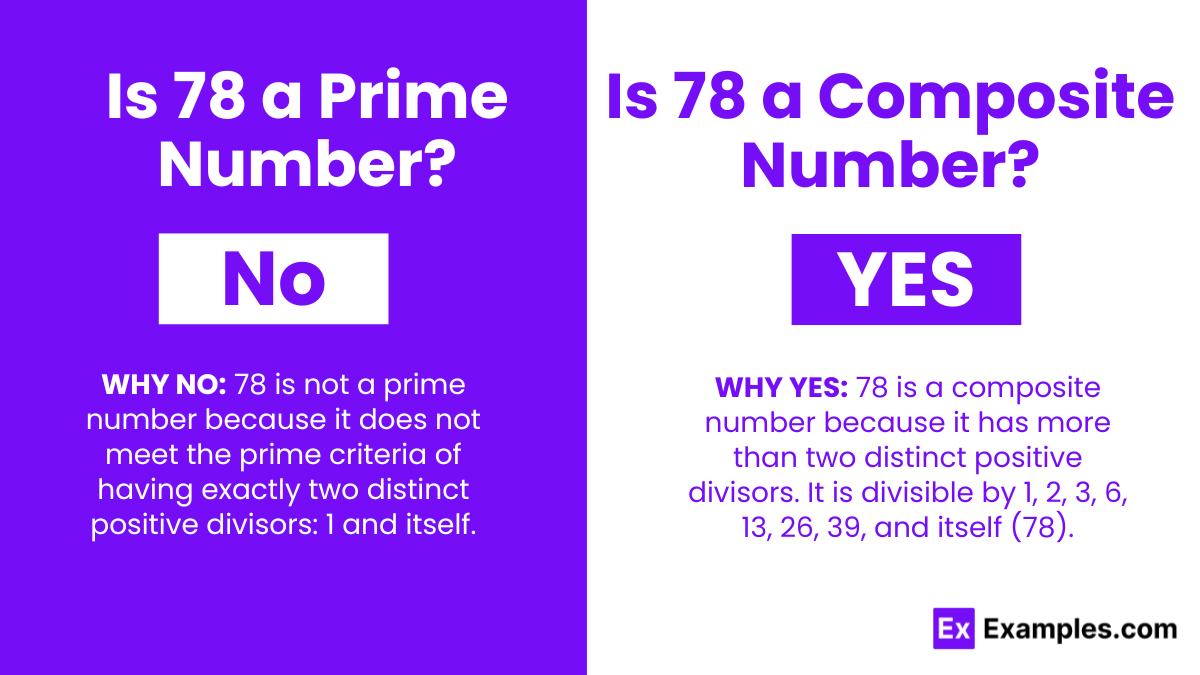Is 78 a prime number?
Yes
No
It is sometimes prime
None of the above

Why No: 78 is not a prime number because it does not meet the prime criteria of having exactly two distinct positive divisors: 1 and itself. Check if any number is prime or not.
Why Yes: 78 is a composite number because it has more than two distinct positive divisors. It is divisible by 1, 2, 3, 6, 13, 26, 39, and itself (78).
| Property | Answer |
|---|---|
| Is 78 a prime number? | No |
| Is 78 a composite number? | Yes |
| Is 78 a perfect square? | No |
| Factors of 78 | 1, 2, 3, 6, 13, 26, 39, 78 |
| Multiples of 78 | 78, 156, 234, 312, 390, 468, 546, 624, 702, 780 |
| Cube Root of 78 | Approximately 4.28 |
| Square of 78 | 6084 |
| Square Root of 78 | Approximately 8.832 |
| Is 78 a Perfect Cube? | No |
| Is 78 an Irrational number | No |
| Is 78 a Rational number | Yes |
| Is 78 a Real number | Yes |
| Is 78 an Irrational number | Yes |
| Is 78 a Natural number | Yes |
| Is 78 a Whole number | Yes |
| Is 78 an Even or odd number | Yes (78 is an even number) |
| Is 78 an Ordinal number | Yes |
| Is 78 a Complex number | Yes (as all real numbers are also complex numbers) |
The factors of 78 are 1, 2, 3, 6, 13, 26, 39, and 78. 78 is not a prime number because it is divisible by numbers other than 1 and itself, demonstrating it has more than two factors. This clarity confirms that it is a composite number, not a prime number
78 is categorized as a composite number because it has more than two distinct positive divisors: 1, 2, 3, 6, 13, 26, 39, and itself.
78, as a composite number, occupies a different position in mathematics compared to prime numbers. Unlike a prime number that is divisible only by 1 and itself, 78’s divisibility by 1, 2, 3, 6, 13, 26, 39, and itself illustrates its composite nature. Its properties as an even number, a composite, and a natural number make it an interesting figure in various mathematical discussions.
The nearest prime numbers to 78 are 73 and 79. 73 is the closest prime number less than 78, and 79 is the closest prime number greater than 78.
78 is considered a composite number because it is divisible by numbers other than 1 and itself. The presence of additional divisors such as 2, 3, 6, 13, 26, and 39 confirms its status as a composite number.
To determine if a number is prime or composite, you can try dividing it by numbers greater than 1 and less than itself. If the number can be divided evenly by any of these numbers, it is composite. If not, it is prime.
Text prompt
Add Tone
10 Examples of Public speaking
20 Examples of Gas lighting
Is 78 a prime number?
Yes
No
It is sometimes prime
None of the above
Which of these statements is true for the number 78?
It is a prime number
It is less than 80
It is a perfect square
It is only divisible by 1 and 78
Which property is characteristic of the number 78?
It is a perfect square
It has exactly two factors
It can be divided by 2 and 39
It is divisible by 10
If 78 is divisible by both 2 and 3, what type of number is it?
Prime
Composite
Rational
Imaginary
Which of these numbers is a factor of 78?
21
8
39
25
What is the result of dividing 78 by 39?
2
3
1
5
Which number is NOT a divisor of 78?
1
39
22
6
Which of these statements about 78 is correct?
78 is a prime number
78 is divisible by 4
78 can be factored into 2 × 3 × 13
78 is less than 50
What property confirms that 78 is not a prime number?
It ends in an 8
It is divisible by 3
It is an even number
It is greater than 50
What can be said about the number 78 if it is divisible by both 2 and 3?
It is a prime number
It is a perfect square
It is a composite number
It is a fraction
Before you leave, take our quick quiz to enhance your learning!

